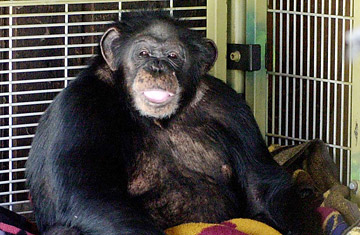
In this Oct. 20, 2003 photo, Travis, then a 10-year-old chimpanzee, sits in the corner of his playroom at the home of Sandy and Jerome Herold in Stamford, Conn.
The ferocious attack by a chimpanzee of a woman in Stamford, Conn., on Feb. 16 wasn't a question of if but of when.
The 200-lb. chimp named Travis, whose owner, Sandra Herold, 70, raised him as part of her own family, had no history of violence — aside from one incident in 2003, when he escaped and stopped traffic in Stamford for hours. But when Charla Nash, 55, a friend of Herold's, visited on Monday afternoon, Travis suddenly lashed out at her. The 14-year-old chimpanzee latched onto Nash's face and tore it apart. (See pictures of animals facing extinction.)
The victim's injuries were reportedly gruesome; the head paramedic who treated Nash on the scene told the New York Times that he had "never seen anything this dramatic on a living patient." Nash remains in extremely critical condition. The chimp was shot dead by a police officer, who was also attacked.
But even as investigators try to figure out exactly what triggered Travis's attack (he had been suffering from Lyme disease, which in rare cases is linked to psychotic behavior), the reality is that a chimpanzee living among people is simply a ticking time bomb. No matter how many years it has lived peacefully as a pet, a chimpanzee is not a domesticated animal and can snap without warning. "They are wild animals, and all wild animals are potentially dangerous," says Colleen McCann, a primatologist with the Wildlife Conservation Society (WCS) and New York's Bronx Zoo. "They are not pets. This is tragic, but it's not surprising." (See pictures of animals in space.)
It might be hard to imagine that a chimpanzee — familiar from zoos, animal shows and slapstick comedies like Cannonball Run — could be capable of the kind of savage violence inflicted on Nash. Travis himself was reportedly a beloved figure around Stamford; he was recognizable from television commercials, could bathe and dress himself and use a computer — qualities that made him seem dangerously close to human.
But adult chimpanzees might be better described as superhuman — a 200-lb. chimpanzee is five to seven times stronger than a person of the same size, especially in the upper body. "They are incredibly powerful, and people underestimate that," says McCann. "An adult male chimpanzee is a formidable animal. I would not want to be standing next to one." (See pictures of animals with prosthetic limbs.)
Nor are wild chimpanzees the docile, childlike creatures portrayed on TV. Highly territorial, chimpanzees will attack and kill other chimps. Though mostly vegetarian, they will also hunt and kill other animals for food; young male chimpanzees in Africa have been known to fashion crude weapons and use them to hunt bushbabies for meat. Attacks on human beings are rare, but they do happen — and the results are often catastrophic. The former NASCAR driver St. James Davis, who raised a chimpanzee as a pet, was attacked by escaped chimps at an animal sanctuary in 2005; he was left with injuries and disfigurement so severe that doctors kept him in a medically induced coma for three months. (See pictures of the 50th running of the Daytona 500.)
Pet chimpanzees are also reservoirs of disease and can pass along infections like yellow fever, monkey pox and the Marburg virus to their human keepers.
Despite the potential threat chimpanzees pose, many U.S. states, including Connecticut, legally allow people to raise them as pets. Primatologists like McCann argue that chimpanzees should never be kept privately, and the WCS supports the Captive Primate Safety Act, a bill pending in Congress that would ban the private selling of primates as pets. The bill has stalled since it was introduced in 2005, but the Stamford assault may well renew its debate. "This is a tragedy for the families involved, for the animal and for the community — but it's not a unique story," says McCann. "When humans keep wild animals as pets, they pose a danger, and more times than not it will end in tragedy."
In Travis's case, his owner was forced to call 911, then attack and repeatedly stab him — a cherished pet she had reared for years — with a butcher knife in a desperate attempt to save her friend.
